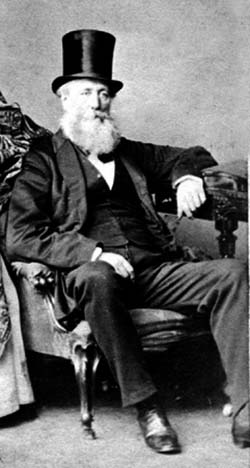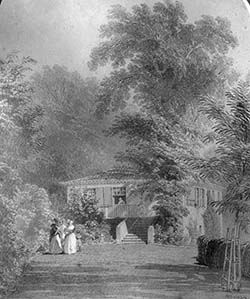Joseph PHELPS 1791 - 1876
Seventh child, third son of William PHELPS (1749–1831) and Elizabeth PEYTON (1757–1829)
Born 24th September 1791, Funchal, Madeira.
Died 3rd April 1876, Clapham, London. Buried in Brookwood Cemetery, Woking, Surrey
Married 17 August 1819 to Elizabeth DICKINSON (1795–1876)
Children
1) Elizabeth (Bella) PHELPS 1820 – 1893
2) Mary PHELPS 1822 – 1896
3) Anne (Kitty) PHELPS 1824 – 1895 m. Robert BAYMAN 1820 – 1881
4) Frances (Fanny) PHELPS 1826 – 1890 m. John EVANS 1823 – 1908
5) Harriet PHELPS 1828 – 1925 m. John CROMPTON 1815 – 1889
6) Joseph Francis PHELPS 1829 – 1922 m. Fanny ROBINSON 1841 – 1924
7) Clara PHELPS 1831 – 1897 m. John OAKLEY 1834 – 1890
8) Charles PHELPS 1833 – 1908
m. 1) Agnes NEALE 1844 – 1876
m. 2) Katherine WILKINSON 1842 – 1911
9) William PHELPS 1836 – 1911 m. Katherine GLASSE 1842 – 1908
10) Arthur PHELPS 1837 – 1920 m. Carolyn Ann PEYTON 1833 – 1904
11) Jane (Janey) de Brissac Frederica PHELPS 1842 – 1926
Carmo House
Joseph's parents were the first generation of the family to make their home in Madeira, where they built Carmo House in Funchal. This housed the family as well as the offices of the wine exporting business, which later expanded to include the production of wine, and trade in various other commodities.
Joseph
After early lessons from his parents and older sisters, Joseph attended Mr Burford's school in England and later Winchester College. He joined the family business when he left school and became a partner with his father and brother-in-law Robert PAGE, in 1814. The partnership had bought Quinta do Prazer in Monte, above the city, in 1803 and the family spent much of the summer at this cooler home, though Joseph would often walk the 6km down to the office for the day – and back, a rise of some 600 metres.
Quinta do Prazer, the Phelps home in Monte,
above the town of Funchal, Madeira
Like many residents of Madeira, he had bouts of dysentery, some very severe which necessitated visits to England to recover. While there he would try to obtain orders for wine; many of his regular customers were clergymen whose communion wine he supplied. A number of his children were living in England at various times, for health reasons or schooling so he would be able to see them and his siblings too.
He was involved in many community projects in the Island, the chief of which was the establishment of a school for boys in 1819, following the Lancaster method, whereby older pupils taught the younger ones. Joseph and his family were also involved in the controversy between "high" and "low" factions of the Protestant community on the island. As music-lovers, the Phelpses enjoyed choral services which were viewed with suspicion by some. Their daughter Mary played the organ in church, and they were very friendly with the Reverend Lowe who was influenced by the high church Oxford Movement. Lowe often attended musical parties at the Phelps's home, where he, local musicians and Joseph's daughters would sing or play the piano or the machete de braça, a local guitar.
Joseph bought further property in the Island, including some near to Carmo House, and created Largo do Phelps, under whose sign various members of the family have been photographed when visiting Madeira.
The mildew disease which struck the vines in 1851 dealt a severe blow to the business from which the family fortunes never fully recovered. Retiring to England in 1862, Joseph bought 46 Larkhall Rise in Clapham, which they named Carmo. There he and Elizabeth were able to enjoy musical parties and the company of some of their siblings, children and grandchildren.
In 1876 Joseph died at home aged 84 and is buried in Brookwood Cemetery, Woking.
Letters written by Elizabeth, Joseph and the children form the basis of The Phelps Family and the Wine Trade in 19th Century Madeira by Anthea Boylston and Penelope Forrest, published by Amazon in 2017.
ISBN 9781979222129

